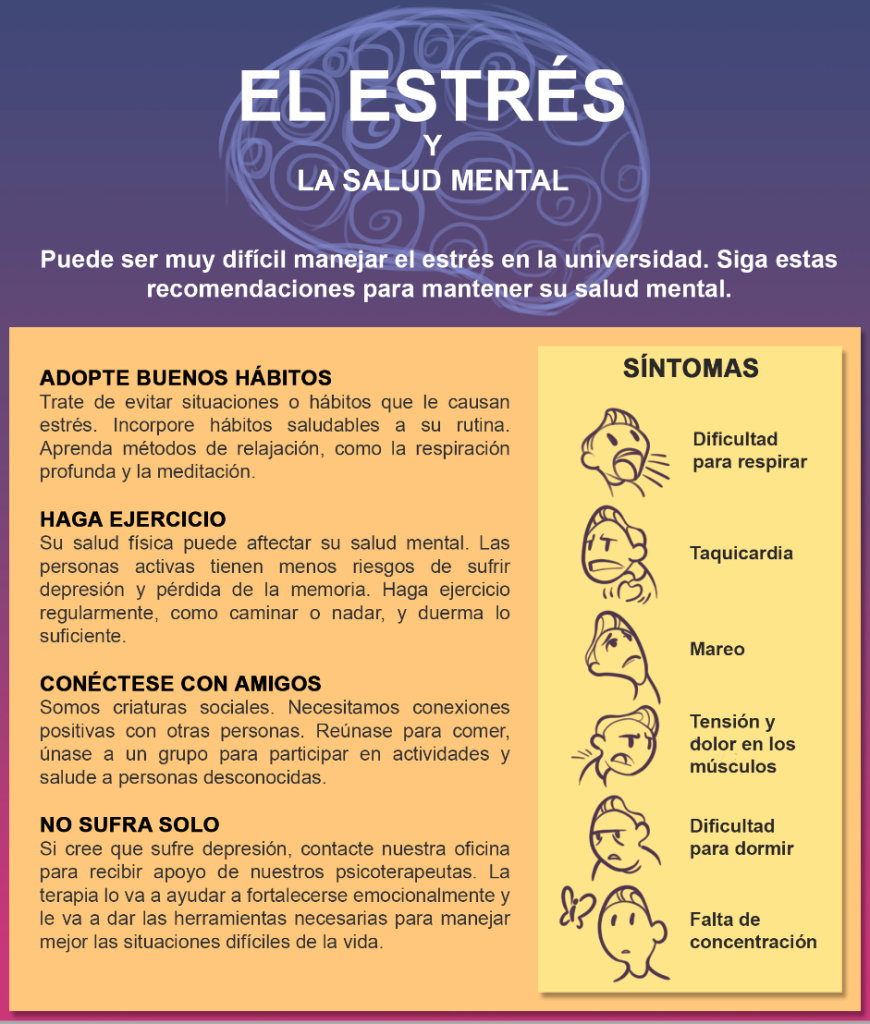Interpretive, Interpersonal, and Presentational Modes of Communication
Exploring Culture
While taking spanish 102, I found myself paying closer attention to spanish culture on social media. For example, the spice tajin seems to be a popular spice used in some spanish speaking countries like Mexico. Online, there are an abundance of videos depicting tajin being used on mangos, candy, and other foods most people in America wouldn’t normally mix with a savory spice blend. I didn’t learn about tajin from class, but I still feel like it offered a window into the culture of spanish speakers. However, we did talk about mate in class, which is a Spanish tea. Mate originates from Argentina and is consumed for health benefits and it connects people with their roots.
After taking Spanish 102, I have come to the realization in the Spanish world, food is a key component of culture. For example, in some Spanish countries, like Argentina, Mate is considered as popular as coffee is in America. The drink may have health benefits, however, nostalgia and cultural reinforcement also play a role in the drink’s popularity. Similarly, coffee may have health benefits but is largely consumed due to social constructs within the United States and people’s emotional connection to the beverage.
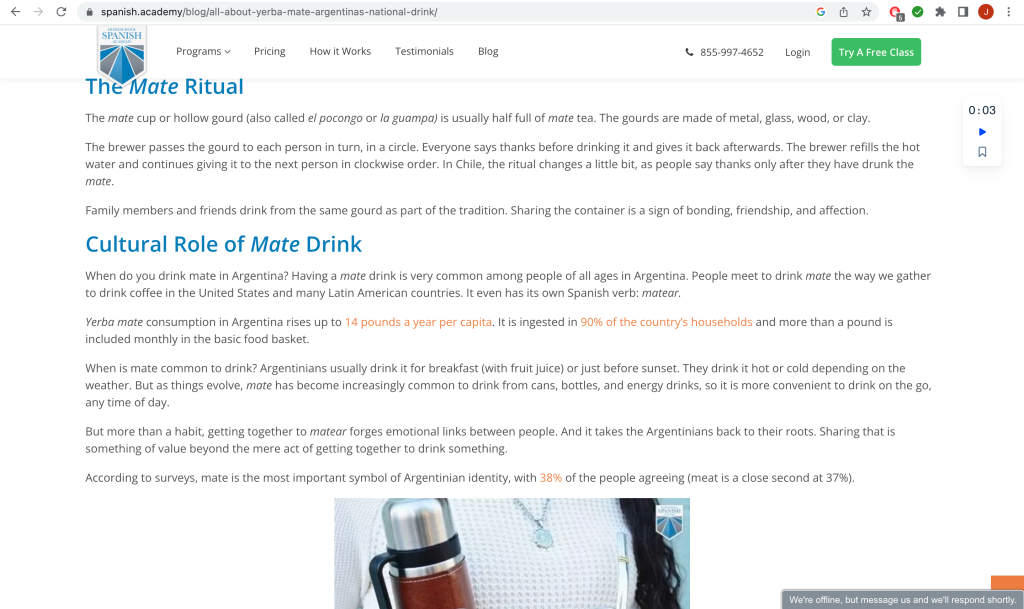
Canún, Nicole. “All About Yerba Mate: Argentina’S National Drink”. Homeschool Spanish Academy, 2021, https://www.spanish.academy/blog/all-about-yerba-mate-argentinas-national-drink/. Accessed 25 Apr 2023.
Engaging in Communities
Engaging in communities allows people to feel connected to society. Humans are social organisms. Without being connected to other people, individual mental health usually suffers. Additionally, everyone has something to offer society as a whole. So, communities allow people to learn from each other, which is why you have organizations like LLCs in universities.
So far, the bulk of my community engagement occurred during freshman year. I was social this semester, however, I don’t have photographs. Below are some photos from previous semesters. I am glad I decided to attend LLC events and study in groups because it allowed me to make friends and succeed academically. However, I do wish I attended more events this semester. I will certainly make more time to attend community activities in the fall.
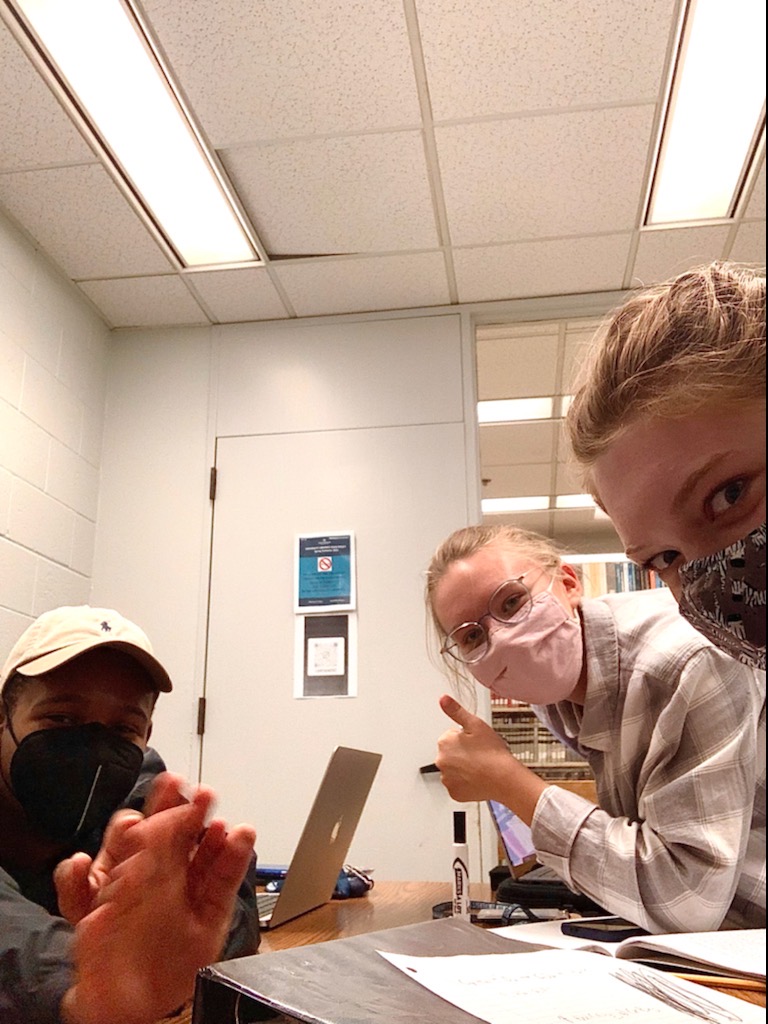
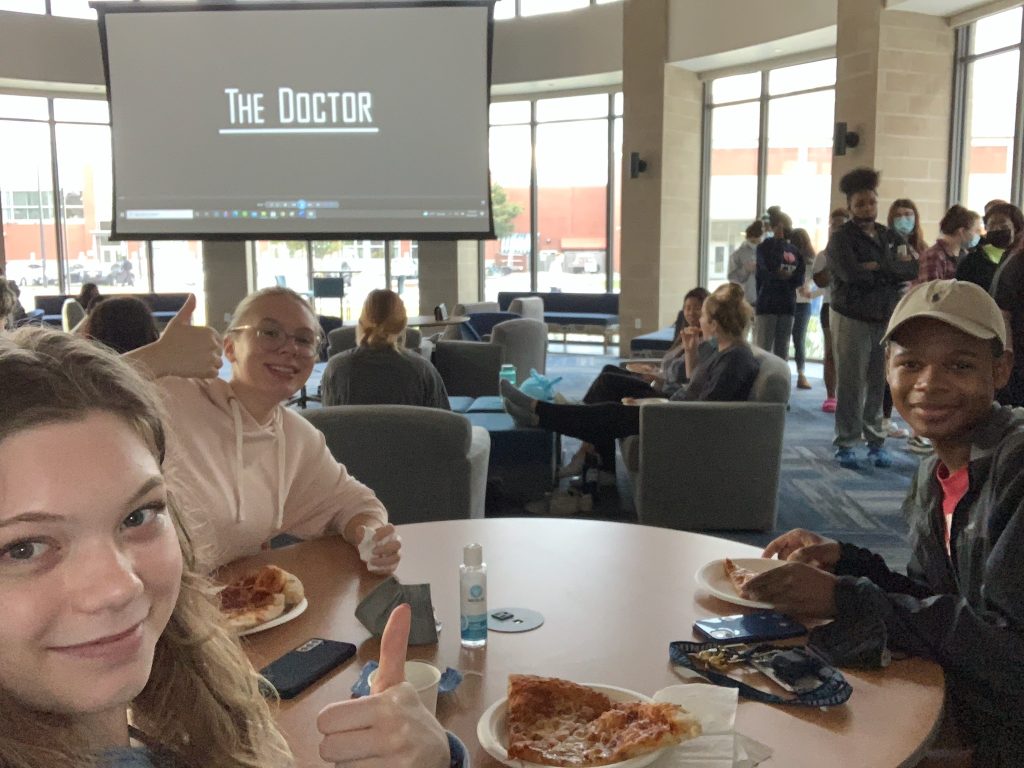
Interpersonal Communication
This semester, I had an array of interpersonal communication assignments. For example, my talk abroad assignments covered information ranging from my family to what foods I like to eat. Because talk-abroad is conversation based, I was also able to learn about other people as well. In addition to Talk Abroad, I was also able to communicate with students through “comentar.”
The Talk Abroad assignments were quite challenging for me. After all, communicating with a stranger is already stressful, but the conversation becomes more challenging when you don’t completely understand the language of the other person. However, Talk Abroad was valuable because I was able to learn about some of the cultural nuances that exist between counties in Latin American and the United States. I didn’t understand everything that was communicated to me in Talk Abroad, but the assignment still proved to be valuable. For “comentar,” I was able to receive feedback on my projects as well as give it to to others. Usually people only gave positive feedback. As a result, the conversations we had usually had weren’t constructive. However, it was interesting to see how my peers constructed sentences in Spanish. I was able to learn from them and vic versa. Next time, I will try to offer more helpful comments at the end of projects. That way, students, including myself, will grow.
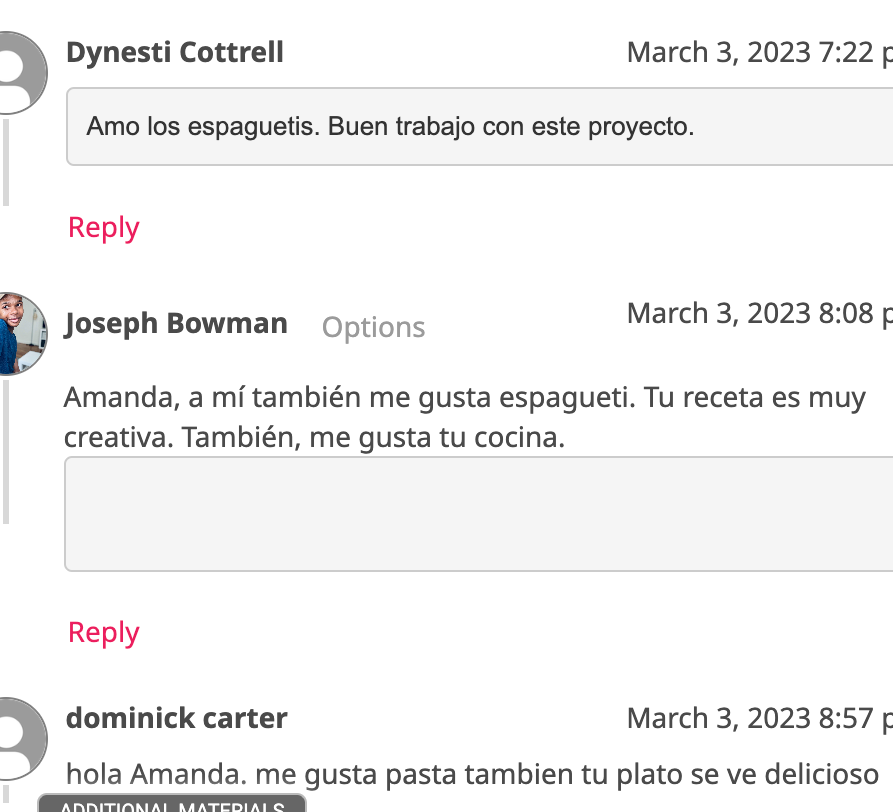
Presentational Speaking
One of my favorite assignments I completed this semester was the module 9 presentational assignment. The assignment was designed to allow students to practice talking in the preterite as well as how to use words related to food. Another presentational assignment I completed was for module 6; in this project, I spoke about what my family is like.
Of the two presentational speaking assignments, the module 6 assignment was probably easier. This is because module 6 did not yet deal with speaking in other tenses. Everything was still in the present. However, it was difficult to remember los padres can refer to both of your parents, whereas los parientes refers to your relatives. The module 8 presentational speaking assignment was my favorite because the words we learned in the unit were useful, such as verbs in the preterite. After all, not every thing people do is in the present. It was difficult at first to remember the preterite verb endings. However, once I got the hang of it, I managed just fine. I overcame the challenge of messing up verb endings by simply practicing repeatedly. I was most successful at having a good attitude throughout the assignment. This is probably because it was fun to film.
Presentational Writing
For presentational writing, I had to complete a text promoting a sport as well as a pamphlet on how to prevent an illness. For the illness prevention pamphlet, I explained how to prevent the coronavirus. For the sports advertisement, I promoted a soccer club.
The sports advertisement was completed first. This is evident because it isn’t my best work. My sentence structure is not organized and my paragraphs are not quite as coherent as I would have liked. Part of the difficulty was the fact I could only right in the present tense. The illness pamphlet was much more enjoyable to create because I had more vocabulary memorized and I could right in different tenses. The addition of command verbs was also helpful. I excelled most at creating the graphics for the illness pamphlet. The sports advertisement is lacking visually, however, I wasn’t sure if I could add imagery in addition to the one that was required.
Interpretive Listening
In spanish 102, the bulk of my interpretive listening activities came from chapter preparation videos. For example, the meal prep box video from module 8 and the career audios from module 10.
The interpretive listening assignments were probably my most challenging assignments this semester. I am not used to Spanish speakers talking at a rapid pace. The Talk Abroad instructors and my professor both speak in a way that is easy for beginners to understand. So, the listening assignments were often jarring. However, I overcame the challenge by listening multiple times. It was also helpful when we went over the audios in class. I found it interesting that the Spanish language seems squish there entire sentences into one word. Not literally of course, but when the rapid fire oration begins, it can sound like a Spanish sentence is one long word to a native English speaker.
Interpretive Reading
In Spanish 102, I completed a significant amount of reading. Some of the readings prepared me for a specific assignment, whereas others offered insight into a particular aspect of a Spanish-speaking country.
The readings were typically challenging because of the sheer amount of unfamiliar vocabulary. I usually had to look up the meaning of every other word. Analyzing the texts was a slow painful process. However, with time, the readings got easier because the vocabulary builds. Once again, it was always much easier to understand when we reviewed the readings in class. For example, we read infographics about maintaining good health in class. The vocabulary wasn’t to bad in this chapter because quite a few of the words were cognates and the unfamiliar vocabulary was explained in during lecture.
